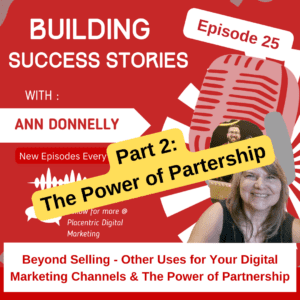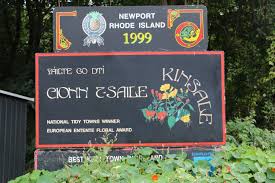
Over the past 25 years, I’ve seen the power of partnership throughout my career in digital marketing. I’ve also seen what can happen when there is a lack of partnership and collaboration.
The tourism industry, where I do a lot of work, is usually based on partnerships around businesses in a certain region or with a similar theme. Businesses that rely on thriving tourism in their region understand the power of working together to promote the region to the outside world.
Most regions have a membership or state-supported organization that promotes the region and the participating businesses, usually a chamber of commerce or tourism. Most tourism businesses find that the more active they are in such an organization, the more it benefits them. Those who work in the “chamber” will know more about your business and can find more ways to assist you. You will meet other members and find ways to work together. You will learn sooner about upcoming activities and events you can participate in.
Partnering Through Town Twinning / Sister Cities

“Town Twinning,” also known as “Sister Cities,” is a good example of a regional partnership. This is very common in Europe, where regions of very different cultures are located at a fairly short distance, but it does occur worldwide. The seaside town of Kinsale, in County Cork, Ireland, has recently celebrated the 25th anniversary of the Town Twinning agreement with Newport, Rhode Island. Authorities and selected participants take turns traveling to the other city for activities and events to celebrate the cultures of each. These cities are known for food and sailing, so the activities often revolve around these. Top chefs travel to competitions, like Chowder cook-offs and food festivals.
Participants share ideas of what has worked and not worked in promoting their regions. The partnership, activities, and events provide additional marketing opportunities to promote the regions and participating businesses.
These partnerships bring benefits beyond tourism. Participants make other business connections and may start to do business in the partner region. Individuals may choose to relocate to the other region, either temporarily or permanently.
Partnering by Industry or Theme

Again, the hospitality industry shows how to partner by industry or theme. For many years, “trails” have been very common in the food and beverage industry as a way to promote these industries and the regions where they are located. For my 60th birthday, I took a few friends for a weekend in the Finger Lakes region of New York State, and I used the resources of the
Keuka Lake Wine Trail to plan the trip. Due to logistics, we only visited one of the member wineries, but I found transportation and other things to do on that website. Trails, tours, and festivals are common ways for food and beverage businesses to collaborate and work together. Adirondack Winery runs the Adirondack Wine and Food Festival, which features several wine, food, and beverage producers and distributors based in New York and Vermont and benefits a local charity. It brings hundreds of visitors, many from outside the local area, and their spending money into Lake George.
Other common industries and themes that commonly collaborate to promote their businesses:
- fine arts and crafts, often in conjunction with food and beverage
- literature
- sports and leisure
- entertainment, i.e. music, comedy, film and TV (look at the popularity of comicons, etc.)
- family and child-related businesses
- animals, pets
- health and wellness
- home and living
- personal services
- weddings and other events
Lessons From The Pandemic on the Need to Form Partnerships
Some businesses only realized the benefits of collaboration and partnership during the pandemic when it was necessary for the business’s and the region’s survival. Larger businesses helped smaller businesses get access to safety and hygiene products. Business leaders, often competitors, worked together to create “opening up” plans to lobby the government.
See also How to Succeed in Tourism During a Pandemic.
Two Examples of Lack of Results When Businesses Don’t Collaborate
Did you know West Cork, Ireland, is a great whale-watching place? Most people don’t! Early in my career, I created websites for the first two whale-watching operators in West Cork. The first was often booked out (because of my great SEO skills) and referred overflow of business to the second. The relationship between the two operators broke down for several reasons I won’t go into, but the fact that they didn’t work together to promote the region as a place for whale-watching stifled the potential to bring visitors from all over the world to West Cork for this activity. Both businesses remained operating at a basic level. Other businesses in the area added whale-watching, and the first operator tried to start a collaboration with a website promoting whale-watching in the area, but perhaps the independent nature of these men meant that the collaboration never achieved its full potential.
Web developers are also often very independent by nature. In the early days of the internet, many left corporate jobs to start their web development businesses and enjoyed the freedom of self-employment. I have often tried to collaborate with other developers to be told, maybe not exactly, but with the feeling of, “No, I don’t need what you do, I can do it all myself.” One of the state-funded agencies started networking breakfasts for the web developers in the region to come together and share ideas on how we can work together — and how that agency can help us with funding to do this. Several web developers attended, but only two people stood up and offered ways to collaborate: me and the other woman in the room. I suggested that we start a collaboration, each focusing on our area of specialization to be more competitive in tendering for larger projects that larger Cork and Dublin-based agencies were winning. The funding agency thought this was a great idea, but other developers didn’t have enough interest for the idea to work. I continued to work independently, providing consulting and coaching services rather than web development. By this time I was spending significant time in our accountancy practice anyway. Many others who attended these sessions continued to work independently and never grew their businesses. Some found this financially unsound and took positions working remotely for large agencies in Cork, Dublin, or London.
Ego can get in the way of your success. That is why a good partnership has clearly defined roles and responsibilities that all agree and adhere to, so no one feels like they are losing control or independence.
How to Ensure Success in Your Partnerships
- Ensure common themes and objectives among the businesses and agencies involved.
- Have a defined mission and working agreements for all to agree and adhere to.
- Include guidelines on grievances with a forum to review and resolve quickly and fairly.
- Clearly define the obligations of each member regarding resources required: funding, people, time, leadership, etc.
- The rotation of leadership roles will help to ensure a balance of power and that no one is overburdened or has an imbalance of power.
- Ensure the objectives have clear KPIs and monitoring methods so all participants can see the partnership’s results.
How to Find Good Partners and Collaboration Opportunities
- To get started and find participants, seek advice from your local chamber, industry body, county or state agencies, etc. They may help facilitate and fund the collaboration or some of its activities.
- Look at who you are also working with, suppliers, etc., and other businesses your customers may use. Could you collaborate with any of these to boost your businesses?
- Look at your competitors. Are they purely competitors? Are there ways that you can work together to promote your industry or region and create more business for you all?
- As Part 1 of the accompanying podcast notes, digital marketing, particularly social media, is a great way to attract and find partners and ways to collaborate.
“A rising tide lifts all boats.” Many sayings communicate this idea: the more business there is for your region or industry, the more the businesses involved will benefit if they collaborate. Some businesses that don’t participate are likely to find some benefit, but not at the level of those that do. Concern about competition and isolating your business will only stifle your growth. Seek relevant partnerships and collaboration opportunities and see your business, industry, and region thrive.
Take action!
- Identify at least one way you can partner or collaborate with other businesses to create an opportunity for your business, industry, and region, and at least one step to take to get started.
- Then, email admin@placentric.com with your plan and get a quick evaluation.
If you enjoyed this episode and found the information useful:
📍Click here to subscribe to the Next Level Success Newsletter, a weekly email for ambitious individuals looking to take their businesses to the next level with insights, advice, and how-tos from Ann Donnelly’s 40 years of business and marketing experience.
Have a chat with me to see how I can help you increase sales and grow your business:
Click here to visit AnnDonnelly.com and book a call.


